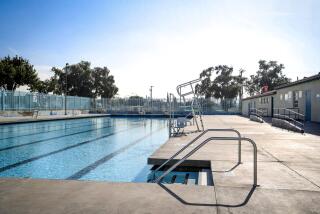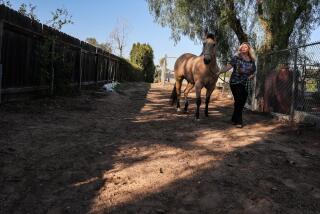At Pools, Beaches, Golf Links : Rescuers to Get AIDS Safeguard
- Share via
Moving to ease fears among rescuers about handling potential AIDS victims, city and county officials have decided to buy manual resuscitators so that workers at pools, beaches and golf courses can avoid performing mouth-to-mouth resuscitation.
City recreation officials plan to distribute about 100 lightweight “mouth-to-mask” resuscitators to lifeguards at city pools and golf course workers. The resuscitators, sold in sets of two for $51, are in adult and children’s sizes and include a second opening so vomit and other fluids do not reach the rescuer’s mouth.
Gear New to County Lifeguards
The county also has bought about 200 mouth-to-mask resuscitators and handed out the $10 units this month to ocean lifeguards, said Bob Williams, chief lifeguard of the Department of Beaches and Harbors.
The county’s 150 lifeguard towers had not previously been supplied with any resuscitators, although vehicles and boats patrolling the beaches and water have been equipped with mechanical devices, Williams said. He said Monday that no lifeguards have used the devices so far.
The actions were spurred by a May 19 incident in Topanga Canyon in which a county firefighter unsuccessfully tried to revive a man with mouth-to-mouth resuscitation. The man later was found to have acquired immune deficiency syndrome, or AIDS, and hepatitis B.
There are no documented cases of AIDS being transmitted through mouth-to-mouth contact, and medical researchers believe that the AIDS virus is only transmitted when blood, semen or other body fluids are transferred in large quantities or repeatedly. But some Los Angeles lifeguards have been worried about the risks, recreation officials said.
Devices Called Reassurance
“I’m just trying to keep my troops from going into a frenzy,” said John Vowels, an aquatic director for the city Department of Recreation and Parks. “I want to have everything on line so no one will hesitate to work for me.”
The city’s 44 seasonal swimming pools, which opened Saturday, are not now equipped with mechanical or manual respirators, although the seven year-round pools already have mechanical resuscitators, officials said.
Rescuers using the “mouth-to-mask” devices blow air into a tube connected to a mask covering a victim’s mouth and nose.
County fire officials plan to outfit all emergency vehicles with mouth-to-mask resuscitators. The city Fire Department is considering a similar plan.
“As a lifesaving organization, I can’t afford to take the risk that an employee won’t give mouth-to-mouth resuscitation for fear of getting AIDS,” said Charles James, who oversees the 15 city pools in the San Fernando Valley. “We’re essentially addressing the fear of contracting AIDS more than the disease itself.”
James and other officials said, however, that lifeguards are instructed to do what is necessary to revive drowning victims, even if resuscitation equipment is not at hand.
“If you’re paranoid about catching AIDS, maybe you’re in the wrong business,” James said. “We’re paid to be lifesavers.”
More to Read
Sign up for Essential California
The most important California stories and recommendations in your inbox every morning.
You may occasionally receive promotional content from the Los Angeles Times.













